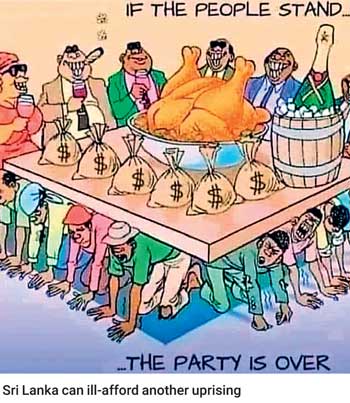Monday Feb 16, 2026
Monday Feb 16, 2026
Saturday, 8 October 2022 00:00 - - {{hitsCtrl.values.hits}}
 Sri Lanka continues to struggle from the worst man-made economic crisis triggered by conflicting LKR and exchange policies, poor economic policies, excessive bureaucracy and economic mismanagement. The country has been hit by high inflation and forex shortages, accompanied by trade and exchange controls and very high interest rates that have wrecked most of the SMEs.
Sri Lanka continues to struggle from the worst man-made economic crisis triggered by conflicting LKR and exchange policies, poor economic policies, excessive bureaucracy and economic mismanagement. The country has been hit by high inflation and forex shortages, accompanied by trade and exchange controls and very high interest rates that have wrecked most of the SMEs.
The SMEs that form the backbone of the country and make up a large part of Sri Lanka’s economy are the worst hit and are gradually leading to massive unemployment. SMEs are an essential source of employment opportunities and rural income and are estimated to contribute about 35% of employment. The profitable companies prior to the Easter attacks therefore need to be handheld to come out of the crisis.
The SMEs are desperate that the Government addresses the high cost of borrowings and to assist them to find new markets for SMEs to expand and grow. In addition, set up Business Rehabilitation Units to support, advise and hand hold affected businesses towards revival. Allow importation of essential inputs to improve domestic production such as machinery, spares and raw material. Revamp existing strategies to promote tourism. Negotiate with donor agencies for soft loans to support SME business revival and also to ensure the Government provides the required fertiliser to increase the supply side to reduce food inflation.
The SMEs cannot be held responsible for the misguided economic policies of successive governments. Given the power cuts most mid-sized and small-sized firms do not have the back-up electricity as the country struggles to provide uninterrupted power. To stop the flight of foreign currency leaving the country, Sri Lanka’s Government placed import restrictions on certain items; this has led to serious shortages and a sudden price rise for raw material and shortages.
Way forward
 As a country we need a hard reset and develop a strategy for sustained economic development. We would need to;
As a country we need a hard reset and develop a strategy for sustained economic development. We would need to;
• corporatise non-performing SOEs
• widen tax net
• cut Government expenditure and build public service capacity
• increase FDI
• increase export of industrial manufactures to reach total export value of $ 20 billion
It is now essential to implement a new economic model for responsible development, which will ensure support for exports acceleration, new industries, innovation and digitalisation. All political parties therefore must now work together without driving away any prospects for foreign investors and create the conditions for business revival. They must work on the basis that a running country is required to play any brand of politics. A failed state does not provide a platform for any political party to grow and perform.